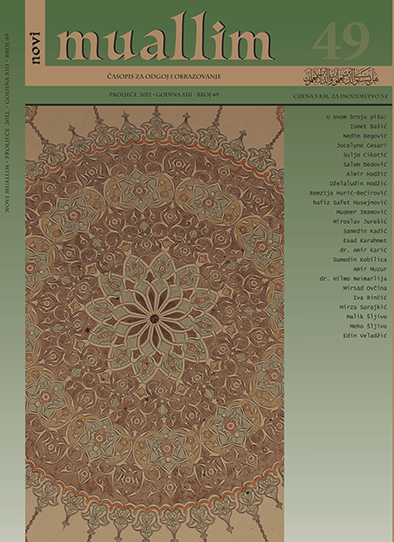THE EMOTIONAL CLIMATE IN THE MAKTAB
DOI:
https://doi.org/10.26340/muallim.v13i49.543Abstract
Maktab is the most widespread form of educational institution in Bosnia and Herzegovina. These classes help fulfil parental duties towards children as well as the rights that children have in this regard. Family alone does not have all the required competencies and potentials needed to offer a child an adequate Islamic upbringing and education. The emotional climate in the class is very important for motivation of students, positive achievements in learning as well as for their lasting emotional stability. According to some studies, occasional warnings may be an indicator of some form of inadequate behaviour like: atmosphere of fear, boredom, passive resistance and intolerance. Whereas effective learning in the classroom can be recognised through the positivity and productivity of the climate in the class as a type of the positive social relations, a form of teacher student communication and the emotional bond between them that further leads to a good and lasting results in learning, while keeping healthy emotional relations towards others and one’s own self. All the factors that influence the work climate in maktab are same as those that influence the school classroom. The first of these factors is muallim, thus we have two different styles of behaviour: direct and indirect. The second factor is the student, in mactab class we have different students shy, aggressive, inward and outward, those that boost of themselves" students that cheat in tests and those that are new in the class. Classroom climate in the maktab is influenced by other factors as well, like: time of holding classes, natural and social surrounding, exterior and interior decoration of maktab and the good organisation on majlis level and on the level of jamaat as well as healthy human relations.
Downloads
Published
How to Cite
Issue
Section
License
Naknada:
a. Časopis ne naplaćuje naknadu za obradu članaka (APC) i naknadu za podnošenje članaka.
Autori koji objavljuju u ovom časopisu pristaju na sljedeće uvijete:
- Autori zadržavaju autorska prava i pružaju časopisu pravo prvog objavljivanja, pri čemu će rad jednu godinu po objavljivanju biti podložan licenci Creative Commons imenovanje koja omogućuje drugima da dijele rad uz uvijet navođenja autorstva i izvornog objavljivanja u ovom časopisu.
- Autori mogu izraditi zasebne, ugovorne aranžmane za ne-ekskluzivnu distribuciju rada objavljenog u časopisu (npr. postavljanje u institucionalni repozitorij ili objavljivanje u knjizi), uz navođenje da je rad izvorno objavljen u ovom časopisu.


